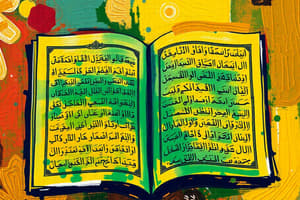Podcast
Questions and Answers
The Quran was revealed to Prophet Muhammad (peace be upon him) over a period of 23 years.
The Quran was revealed to Prophet Muhammad (peace be upon him) over a period of 23 years.
True (A)
The Islamic calendar is based on the lunar cycle and has _______ months.
The Islamic calendar is based on the lunar cycle and has _______ months.
12
What is the name of the companion of Prophet Muhammad (peace be upon him) who was known as the 'Lion of the Battlefield'?
What is the name of the companion of Prophet Muhammad (peace be upon him) who was known as the 'Lion of the Battlefield'?
Ali ibn Abi Talib
Match the following Islamic scholars with their areas of expertise:
Match the following Islamic scholars with their areas of expertise:
What is the name of the first revealed chapter of the Quran?
What is the name of the first revealed chapter of the Quran?
Which of the following is NOT a primary source of Islamic law?
Which of the following is NOT a primary source of Islamic law?
The branch of Islamic jurisprudence that deals with social transactions, such as marriage and business dealings, is called:
The branch of Islamic jurisprudence that deals with social transactions, such as marriage and business dealings, is called:
Which school of thought in Islamic jurisprudence emphasizes the practices of the people of Medina?
Which school of thought in Islamic jurisprudence emphasizes the practices of the people of Medina?
What is the term for a scholarly opinion on a contemporary issue in Islamic law?
What is the term for a scholarly opinion on a contemporary issue in Islamic law?
Which of the following statements accurately describes the relationship between Fiqh and modern issues?
Which of the following statements accurately describes the relationship between Fiqh and modern issues?
Which of the following is NOT a core principle underlying Islamic finance?
Which of the following is NOT a core principle underlying Islamic finance?
The term 'Ijma' refers to:
The term 'Ijma' refers to:
Which school of thought in Islamic jurisprudence emphasizes the importance of Hadith and literal interpretation?
Which school of thought in Islamic jurisprudence emphasizes the importance of Hadith and literal interpretation?
Which of the following is NOT a branch of Islamic jurisprudence?
Which of the following is NOT a branch of Islamic jurisprudence?
Which of the following best describes the importance of Fiqh in the Muslim community?
Which of the following best describes the importance of Fiqh in the Muslim community?
Flashcards are hidden until you start studying
Study Notes
Quran and Revelation
- The Quran was revealed to Prophet Muhammad (peace be upon him) over a span of 23 years.
- The first revealed chapter of the Quran is Surah Al-Alaq.
Companions of the Prophet
- Ali ibn Abi Talib, the cousin of Prophet Muhammad (peace be upon him), is known as the 'Lion of the Battlefield' for his bravery in battles.
Islamic Calendar
- The Islamic calendar follows the lunar cycle and comprises 12 months.
Islamic Scholars
- Various scholars across Islamic history have specialized in distinct fields such as jurisprudence, theology, and linguistics, contributing significantly to Islamic knowledge and understanding.
Definition and Scope
- Islamic Fiqh is the study of Islamic jurisprudence, addressing the application of Islamic law in daily life.
- It encompasses the interpretation of Islamic principles to resolve both legal and social issues.
Sources of Fiqh
- The Quran serves as the principal source of Islamic law.
- The Hadith includes the sayings, actions, and approvals of Prophet Muhammad (peace be upon him), providing essential guidance.
- Ijma' refers to the consensus achieved among Muslim scholars regarding specific issues.
- Qiyas employs analogical reasoning based on established sources such as the Quran and Hadith.
- Ijtihad allows qualified scholars to engage in individual reasoning and interpretation of Islamic law.
Branches of Fiqh
- Ibadat: Focuses on rituals and acts of worship, including prayer, fasting, and pilgrimage.
- Muamalat: Governs social transactions, covering aspects such as marriage, divorce, and business dealings.
- Jinayat: Pertains to criminal law, addressing punishments and compensations for various crimes.
- Aqd: Deals with contracts and agreements that encompass sales, leases, and partnerships.
Schools of Thought (Madhahib)
- Hanafi: Founded by Abu Hanifa, it emphasizes the use of reason and analogy in jurisprudence.
- Maliki: Established by Malik ibn Anas, this school prioritizes the practices of the residents of Medina.
- Shafi'i: Developed by Muhammad ibn Idris al-Shafi'i, it highlights the significance of Hadith in legal decisions.
- Hanbali: Created by Ahmad ibn Hanbal, it stresses the importance of Hadith and a literal interpretation of texts.
Fiqh and Modern Issues
- There is a call for Ijtihad to reinterpret Islamic law to address contemporary challenges faced by Muslims today.
- Fatwas play a critical role by offering scholarly opinions on current issues like bioethics, finance, and human rights matters.
- Islamic finance exemplifies adherence to Islamic principles through the development of compliant financial systems and instruments.
Importance of Fiqh
- Fiqh offers Muslims guidance on living in alignment with Islamic principles and values.
- It plays a significant role in promoting social justice and welfare within the community.
- The adaptability of Islamic law facilitated by Fiqh allows for appropriate responses to changing contexts and circumstances.
Studying That Suits You
Use AI to generate personalized quizzes and flashcards to suit your learning preferences.




